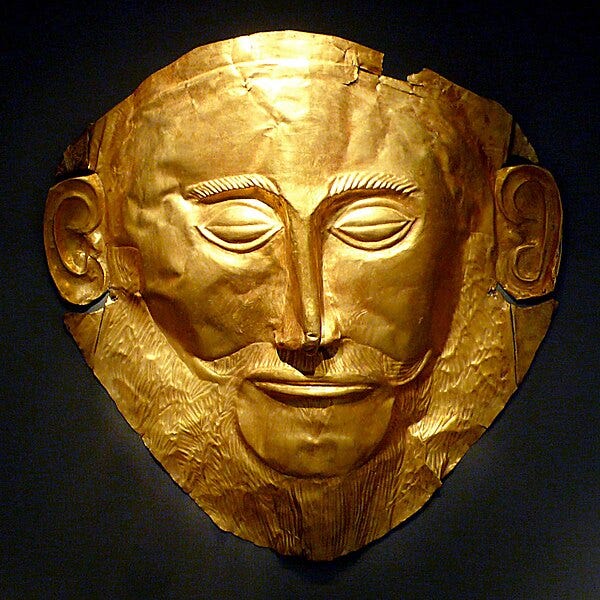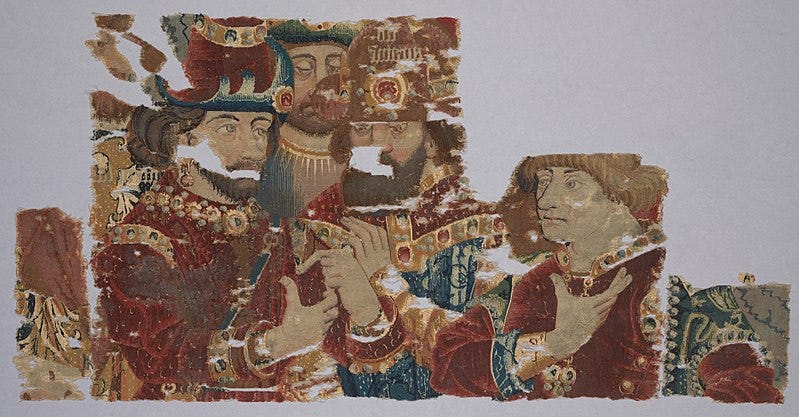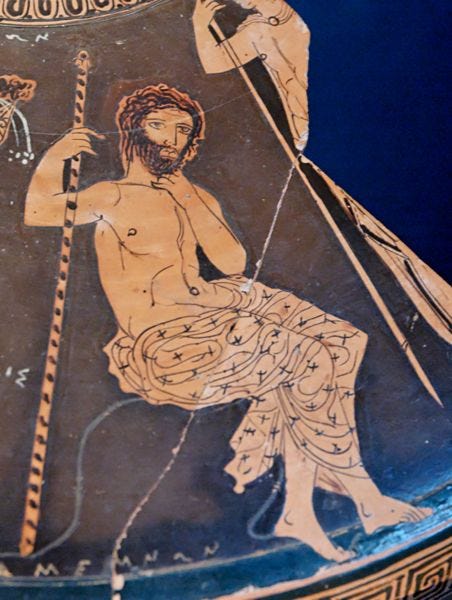This post is a continuation of my substack on the Iliad. All proceeds from the substack are donated to classics adjacent non-profits on a monthly basis. Last year this substack provided over $2k in charitable donations.
Book 13 splits almost easily into three parts. Poseidon’s actions echo the events of book 13 and Hera’s seduction of Zeus, which involves Poseidon to the extent that he will be rallying the Greeks during Zeus’ distraction, seems almost as if it could be an entirely independent episode. There are some interwoven themes, however: the foolishness of Agamemnon at the beginning of the book could be seen to anticipate Zeus’ own failures as a leader during the seduction scene, while the coalition of wounded Greek leaders joining together at the book’s beginning is balanced by the efforts of the second rank of Trojan leaders (especially Sarpedon and Polydamas) to defend Hektor and lead the Trojans after Hektor falls).
Structure of Iliad 14
1-133 Nestor and the Council of Kings
134-360 Seduction of Zeus
361-522 Rallying of Greeks, wounding of Hektor
The first portion of this book echoes two earlier scenes that help to characterize the Achaean political organization. In both books 2 and 9, Agamemnon expresses a desire to depart and this triggers a response that reaffirms a larger will to stay. In book 2, he ‘tests’ the army and they run to the ships, only to be restrained and rallied by Odysseus and Nestor. In book 9, he again suggests fleeing, only to be opposed by Diomedes and then redirected by Nestor. At the beginning of book 14, all of the best of the Achaeans are sidelined from battle. Here, Nestor is drawn into action by the sound of battle and when he asks Agamemnon for a plan, that glorious son of Atreus, proposes that the wounded leaders withdraw into a ship and row out into the bay and await nightfall.
Elton Barker and I wrote an article comparing Agamemnon’s claim that “there’s no criticism for running away, not even in the night” (οὐ γάρ τις νέμεσις φυγέειν κακόν, οὐδ' ἀνὰ νύκτα, 14.80) with the new Archilochus fragment where the speaker runs away from Telephos along with Archilochus’ shield poem. We argue that the common strains are evidence of something of a poetic tradition of debating bravery and self-preservation, emphasizing that Homer and Archilochus are engaged with rhetorical repositioning in response to each other.

(As Melissa Mueller effectively argues in her recent book on Sappho and Homer, there’s great interpretive advantage to putting Lyric/Elegiac poets in a non-hierarchical relationship with each other. In our work, Elton and I have tried to emphasize that because of the nature of composition in performance and the many versions of any tale that were told previous to textualization, it is just as likely that our version of Homer is responding to ideas extant in Archilochus and Sappho as it would be that Sappho and Archilochus are responded to the Homeric text we have.)
Agamemnon presents an unheroic plan unbecoming to the leader of the army. He attempts to use proverbial sounding language justifying retreat in the face of considerable danger in a context in which his retreat would doom the army. Rather than presenting a Tyrtaeus/Callinus shaming speech, declaring that only cowards run and they’re likely to die anyway, Odysseus focuses on the larger picture:
Iliad 14.83-102
‘Son of Atreus, what kind of word has escaped the bulwark of your teeth?
You’re a disaster, I wish that you would order some other unfit army,
that you didn’t rule us, those for whom Zeus has assigned
work over harsh wars from youth right up
to old age, until each of us perishes.
Do you really desire to abandon in this way
the wide-wayed city of the Trojans, for which we have suffered many evils?
Be quiet! Lest any one else of the Achaeans hear this plan
which no man, at least, would ever release from his mouth,
a man who knows how to utter fit things in his thoughts,
a scepter-bearing man and one to whom the host assents,
the size of the host you rule over among the Achaeans.
Now I question your thoughts altogether, what sort of thing you have spoken,
you who call us, when the war and strife have been joined,
to drag the well-benched ships to the sea, so that more still
to boast over might occur for the Trojans who have already overpowered us,
and harsh ruin might fall over us. For the Achaeans will not
withstand the war while the ships are dragged to the sea,
but they will look back at us and forget their battle-lust.
There, then, leader of the host, your plan will destroy us.’
᾿Ατρεΐδη ποῖόν σε ἔπος φύγεν ἕρκος ὀδόντων·
οὐλόμεν’ αἴθ’ ὤφελλες ἀεικελίου στρατοῦ ἄλλου
σημαίνειν, μὴ δ’ ἄμμιν ἀνασσέμεν, οἷσιν ἄρα Ζεὺς
ἐκ νεότητος ἔδωκε καὶ ἐς γῆρας τολυπεύειν
ἀργαλέους πολέμους, ὄφρα φθιόμεσθα ἕκαστος.
οὕτω δὴ μέμονας Τρώων πόλιν εὐρυάγυιαν
καλλείψειν, ἧς εἵνεκ’ ὀϊζύομεν κακὰ πολλά;
σίγα, μή τίς τ’ ἄλλος ᾿Αχαιῶν τοῦτον ἀκούσῃ
μῦθον, ὃν οὔ κεν ἀνήρ γε διὰ στόμα πάμπαν ἄγοιτο
ὅς τις ἐπίσταιτο ᾗσι φρεσὶν ἄρτια βάζειν
σκηπτοῦχός τ’ εἴη, καί οἱ πειθοίατο λαοὶ
τοσσοῖδ’ ὅσσοισιν σὺ μετ’ ᾿Αργείοισιν ἀνάσσεις·
νῦν δέ σευ ὠνοσάμην πάγχυ φρένας, οἷον ἔειπες·
ὃς κέλεαι πολέμοιο συνεσταότος καὶ ἀϋτῆς
νῆας ἐϋσσέλμους ἅλαδ’ ἑλκέμεν, ὄφρ’ ἔτι μᾶλλον
Τρωσὶ μὲν εὐκτὰ γένηται ἐπικρατέουσί περ ἔμπης,
ἡμῖν δ’ αἰπὺς ὄλεθρος ἐπιρρέπῃ. οὐ γὰρ ᾿Αχαιοὶ
σχήσουσιν πόλεμον νηῶν ἅλα δ’ ἑλκομενάων,
ἀλλ’ ἀποπαπτανέουσιν, ἐρωήσουσι δὲ χάρμης.
ἔνθά κε σὴ βουλὴ δηλήσεται ὄρχαμε λαῶν.
Odysseus warns Agamemnon that this is the kind of man that will lead to the very outcome he has lamented on more than one occasion (that he will destroy his own Army). His language is aggressive and also transgressive: he uses bare imperatives, repetitions, insults, and rhetorical questions to reprimand Agamemnon. This scene is, in a way, an inversion of book 2: Nestor starts the questions, Agamemnon says something foolish, and Odysseus puts him in his place. Odysseus can be harsher here because this is the equivalent of a small council (a boulê) where the leaders speak more frankly and directly to each other than if the entire army were listening. Agamemnon backs down quickly in the face of Odysseus’ onslaught:
Iliad 14. 103-108
“Then, Agamemnon the Lord of Men answered him.
“Odysseus, you’re laying into me with reproach so hard!
For my part I won’t order the unwilling sons of the Achaeans
To drag their well-benched ships back into the sea.
But I wish there were someone here who could lay out a plan
Better than this one. Someone young or old. This would be welcome to me.”Τὸν δ’ ἠμείβετ’ ἔπειτα ἄναξ ἀνδρῶν ᾿Αγαμέμνων·
ὦ ᾿Οδυσεῦ μάλα πώς με καθίκεο θυμὸν ἐνιπῇ
ἀργαλέῃ· ἀτὰρ οὐ μὲν ἐγὼν ἀέκοντας ἄνωγα
νῆας ἐϋσσέλμους ἅλα δ’ ἑλκέμεν υἷας ᾿Αχαιῶν.
νῦν δ’ εἴη ὃς τῆσδέ γ’ ἀμείνονα μῆτιν ἐνίσποι
ἢ νέος ἠὲ παλαιός· ἐμοὶ δέ κεν ἀσμένῳ εἴη.
Earlier in the epic speakers have been valued for their age—as Nestor himself makes clear when he responds to Diomedes in book 9 and tells him that he “has not reached the end of speech” since he is so young. Here, in a moment of desperation, Agamemnon basically says he needs a good idea and he doesn’t care where it comes from. The hero who stands up with a better idea is none other than Diomedes. And he’s has a little bit to say first.
Iliad, 14.109-133
Then among them spoke Diomedes, good at the war-cry:
‘The man is near, let us not waste any more time; if you wish
to consent, then may none of you entertain anger
because I am indeed the youngest by birth among you.
I also claim to be the offspring of a noble father,
Tydeus, whom the heaped-up earth covers in Thebes.
For, three blameless children were born to Portheus
and in Pleurôn and steep Kalydon lived
Agrios and Melas, and the third child was the horseman Oineus
the father of my father—and he was conspicuous among them for virtue.
Although he remained there, my father lived in Argos,
driven there, for this, I guess, is how Zeus and the other gods wished it.
He married one of Adrêstos’ daughters, and inhabited a house
rich for living—he had sufficient grain-bearing ploughlands
and around these there where many orchards full of fruit,
and he possessed many flocks. He surpassed all the Achaeans
with the spear—you all must have heard these things, if they’re true.
Hence, do not, by claiming that my birth, at least, is low and cowardly,
disregard the speech that is offered, the one I will speak.
Let us go again to the war, even though we are wounded by necessity.
But, when there, let us keep ourselves out of the strife
of the missiles, lest anyone somehow receive a wound on top of a wound.
Let us rally the others and send them into battle, even those who before
gave into their impulse to hang back and not fight.’Τοῖσι δὲ καὶ μετέειπε βοὴν ἀγαθὸς Διομήδης·
ἐγγὺς ἀνήρ· οὐ δηθὰ ματεύσομεν· αἴ κ’ ἐθέλητε
πείθεσθαι, καὶ μή τι κότῳ ἀγάσησθε ἕκαστος
οὕνεκα δὴ γενεῆφι νεώτατός εἰμι μεθ’ ὑμῖν·
πατρὸς δ’ ἐξ ἀγαθοῦ καὶ ἐγὼ γένος εὔχομαι εἶναι
Τυδέος, ὃν Θήβῃσι χυτὴ κατὰ γαῖα καλύπτει.
Πορθεῖ γὰρ τρεῖς παῖδες ἀμύμονες ἐξεγένοντο,
οἴκεον δ’ ἐν Πλευρῶνι καὶ αἰπεινῇ Καλυδῶνι
῎Αγριος ἠδὲ Μέλας, τρίτατος δ’ ἦν ἱππότα Οἰνεὺς
πατρὸς ἐμοῖο πατήρ· ἀρετῇ δ’ ἦν ἔξοχος αὐτῶν.
ἀλλ’ ὃ μὲν αὐτόθι μεῖνε, πατὴρ δ’ ἐμὸς ῎Αργεϊ νάσθη
πλαγχθείς· ὡς γάρ που Ζεὺς ἤθελε καὶ θεοὶ ἄλλοι.
᾿Αδρήστοιο δ’ ἔγημε θυγατρῶν, ναῖε δὲ δῶμα
ἀφνειὸν βιότοιο, ἅλις δέ οἱ ἦσαν ἄρουραι
πυροφόροι, πολλοὶ δὲ φυτῶν ἔσαν ὄρχατοι ἀμφίς,
πολλὰ δέ οἱ πρόβατ’ ἔσκε· κέκαστο δὲ πάντας ᾿Αχαιοὺς
ἐγχείῃ· τὰ δὲ μέλλετ’ ἀκουέμεν, εἰ ἐτεόν περ.
τὼ οὐκ ἄν με γένος γε κακὸν καὶ ἀνάλκιδα φάντες
μῦθον ἀτιμήσαιτε πεφασμένον ὅν κ’ ἐ¿ εἴπω.
δεῦτ’ ἴομεν πόλεμον δὲ καὶ οὐτάμενοί περ ἀνάγκῃ.
ἔνθα δ’ ἔπειτ’ αὐτοὶ μὲν ἐχώμεθα δηϊοτῆτος
ἐκ βελέων, μή πού τις ἐφ’ ἕλκεϊ ἕλκος ἄρηται·
ἄλλους δ’ ὀτρύνοντες ἐνήσομεν, οἳ τὸ πάρος περ
θυμῷ ἦρα φέροντες ἀφεστᾶσ’ οὐδὲ μάχονται.
῝Ως ἔφαθ’, οἳ δ’ ἄρα τοῦ μάλα μὲν κλύον ἠδὲ πίθοντο·
Where Diomedes starts his response to Agamemnon in book 9 by complaining about how the king has impugned his bravery and fighting effort before, here he also talks about his genealogy. Diomedes may be responding in part to Agamemnon’s earlier use of Tydeus as an example to shame him to fight harder. But he is also setting his story alongside the famous tales of these famous heroes’ families. Genealogical bona fides occupy the vast majority of these speech even after Agamemnon has so directly said he just needs a better plan.
I would go so far as to suggest that Diomedes is working within the confines of the previous speeches: he has been qualified as a warrior not up to his father’s measure in book 4, and yet in book 9 he was criticized for being too young. Here he seems to imply again that his father’s excellence is a necessary but insufficient quality for his own authority to speak. What he specifies about his father’s place is his acceptance into another city and people (Argos, closer to Agamemnon in the Peloponnese) and his high position in that new kingdom. For me, the key to this somewhat unclear logic is the superlative “youngest”—perhaps, Diomedes is saying that just as his father proved himself a useful stranger among the Argives, so too Diomedes’ difference in youth marks him out among the Achaean leaders.

As I write in my dissertation, this scene is one of several that shows the difference in Greek politics in the Iliad is that there are multiple leaders endowed with the authority to speak and advise (in contrast to the Trojans). In revisiting this exchange, moreover, I think it shows much more internal echoing with the earlier political scenes and Diomedes’ exchange with Agamemnon in book 4. Following Odysseus’ abuse, I would dare argue that Agamemnon says “either young or old” because he wants to hear from someone else and might be apologetically opening the door to Diomedes.
Iliad 14
What A Dangerous Thing to Say! Politics and Absurdity in Iliad 14: Dios Apate seduction of Zeus); Politics; Diomedes
Where Did Homeric Book Divisions Come From? Thinking about the thematic Unity of book 14: Book divisions, Homeric performance; textualization
Falling Asleep after Sex and Other Cosmic Problems: The Seduction of Zeus in Iliad 14: The Dios Apate; the Homeric Hymn to Aphrodite
A Short bibliography on Diomedes
n.b this is not an exhaustive bibliography. If you’d like anything else included, please let me know.
Andersen, Öivind. 1978. Die Diomedesgestalt in der Ilias. Oslo.
Barker, Elton T. E. “Achilles’ Last Stand: Institutionalising Dissent in Homer’s Iliad.” PCPS 50 (2004) 92-120.
—,—. Entering the Agôn: Dissent and Authority in Homer, Historiography and Tragedy. Oxford, 2009.
Burgess, Jonathan. 2001. The Tradition of the Trojan War in Homer and the Epic Cycle. Baltimore.
—,—. 2009. The Death and Afterlife of Achilles. Baltimore.
Christensen, Joel P. 2009. “The End of Speeches and a Speech’s End: Nestor, Diomedes, and the telos muthôn.” in Kostas Myrsiades (ed.). Reading Homer: Film and Text. Farleigh Dickinson University Press, 136-62.
Christensen, Joel P. and Barker, Elton T. E.. “On not remembering Tydeus: Agamemnon, Diomedes and the contest for Thebes.” Materiali e Discussioni per l’Analisi dei Testi Classici, no. 66, 2011, pp. 9-44.
Christensen, Joel P. 2015. “Diomedes’ Foot-wound and the Homeric Reception of Myth.” In Diachrony, Jose Gonzalez (ed.). De Gruyter series, MythosEikonPoesis. 2015, 17–41.
Donlan, Walter. “The Unequal Exchange between Glaucus and Diomedes in Light of the Homeric Gift-Economy.” Phoenix, vol. 43, no. 1, 1989, pp. 1–15. JSTOR, https://doi.org/10.2307/1088537. Accessed 2 Oct. 2023.
Dunkle, Roger. 1997. “Swift-Footed Achilles.” CW 90: 227-34
Elmer, David. The Poetics of Consent: Collective Decision Making and the Iliad. Baltimore, 2013.
Fineberg, Stephen. “Blind Rage and Eccentric Vision in Iliad 6.” Transactions of the American Philological Association (1974-), vol. 129, 1999, pp. 13–41. JSTOR, https://doi.org/10.2307/284423.
Gaisser, Julia Haig. “Adaptation of Traditional Material in the Glaucus-Diomedes Episode.” Transactions and Proceedings of the American Philological Association, vol. 100, 1969, pp. 165–76. JSTOR, https://doi.org/10.2307/2935907.
Gantz, Timothy. 1993. Early Greek Myth. Baltimore.
Griffin, Jasper. 1980. Homer on Life and Death. Oxford: Oxford University Press.
—,—.2001. “The Epic Cycle and the Uniqueness of Homer.” in Cairns 2001: 363-84.
Hammer, Dean.“‘Who Shall Readily Obey?” Authority and Politics in the Iliad.” Phoenix 51 (1997) 1-24.
—,—. “The Politics of the Iliad.” CJ (1998) 1-30.
—,—. The Iliad as Politics: The Performance of Political Thought. Norman: University of Oklahoma Press, 2002.
Irene J. F. de Jong. “Convention versus Realism in the Homeric Epics.” Mnemosyne 58, no. 1 (2005): 1–22. http://www.jstor.org/stable/4433613.
Kakridis, Johannes Th. 1949. Homeric Researches. Lund.
Kakridis, Phanis, J. 1961. “Achilles’ Rüstung.” Hermes 89: 288-97.
Lohmann, Dieter. 1970. Dieter Lohmann. Die Komposition der Reden in der Ilias. Berlin.
Mühll, Peter von der. 1952. Kritisches Hypomena zur Ilias. Basel.
Nagy, Gregory. 1979. The Best of the Achaeans. Baltimore.
Nickel, Roberto. 2002. “Euphorbus and the Death of Achilles.” Phoenix 56: 215-33.
Pache, Corinne. 2009. “The Hero Beyond Himself: Heroic Death in Ancient Greek Poetry and Art.” in Sabine Albersmeir (ed.). Heroes: Mortals and Myths in ancient Greece. Baltimore (Walters Art Museum): 89-107.
Redfield, James. 1994. Nature and Culture in the Iliad: The Tragedy of Hektor. Chicago.
—,—. 2001. “A ‘Beautiful Death’ and the Disfigured Corpse.” in Cairns 2001: 311-41.
Rose, P. W. “Thersites and the Plural Voices of Homer.” Arethusa 21 (1988) 5-25.
—,—. “Ideology in the Iliad: Polis, Basileus, Theoi.” Arethusa 30 (1997) 151-99.
Scodel, Ruth. “The Wits of Glaucus.” Transactions of the American Philological Association (1974-), vol. 122, 1992, pp. 73–84. JSTOR, https://doi.org/10.2307/284365.
Willcock, M. 1977. 1977. “Ad hoc invention in the Iliad.” HSCP 81: 41-53.
Wilson, Donna F. Ransom, Revenge, and Heroic Identity in the Iliad. Cambridge: Cambridge University Press, 2002.





I’m a bit late to the game, but have been reading through your Iliad posts and enjoying them very much! Thank you for sharing them! I wanted to respond to this one for a couple of reasons. First off, as an Iraq War veteran, I am fascinated by Agamemnon’s leadership. I write about it in my soon to be published book. I’ve seen good and bad leadership in war and his is a whole third entity. Also, Diomedes is my favorite character and the two interactions between him and Agamemnon you discuss briefly are very interesting to me. He is both so quick to obey yet also so ruffled by the thought of fleeing. There is something there that I feel the Iliad might have done more with. But then he gets injured and we don’t see him again till the funeral games.